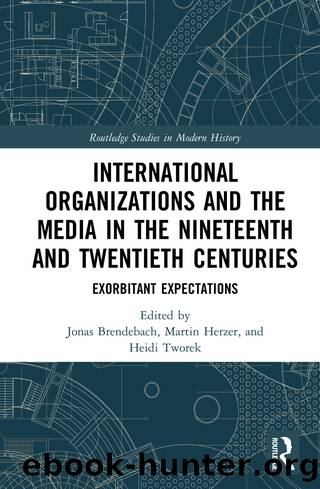International Organizations and the Media in the Nineteenth and Twentieth Centuries by unknow

Author:unknow
Language: eng
Format: epub
Tags: Nonfiction, History, Modern, 19th Century, World History
ISBN: 9781351206419
Publisher: Taylor and Francis
Published: 2018-04-09T04:00:00+00:00
Rumors
Throughout the colonial period, the overwhelming majority of the Algerian population was illiterate, whether in French or in Arabic.22 Consequently, most of their communication was oral, and records of rumors are one of the only ways to gain access to what the illiterate population of Algeria thought of developments in the international system. This evidence must be used with great sensitivity, which calls for two disclaimers.23
First, rumors are only available to us if they were intercepted by the colonial surveillance system, which obsessively tracked them down in an attempt to police Algerian public opinion. The documents we have refract the concerns of French administrators, who were worried with the possibility of a foreign subversion of the ânativesâ (indigènes).24 Any vague mention of a foreign power by Algerians is blown up in reports, which simultaneously dismiss any legitimate grievances Algerians might have had towards the French administration. Thus the reportsâ frequent mentions of international events should not lead us to overestimate the cosmopolitanism of rural Algerians in this period. Nor, however, should it lead us to dismiss it.
Second, rumors are not perfect maps of public opinion. Rumors appear to be popular because they have no discernible author. In fact, this is their determining characteristicâonce they can be traced back to a source, they cease to be rumors.25 The spread of a rumor does indicate something as to its legitimacy, but a rumor does not reflect everyoneâs opinion.
Most rumors remained locally confined. For instance, in 1926, a panic swept the region of Cassaigne (now Sidi Ali), a coastal rural area in the West of Algeria. Rumors had spread alleging that Americans were going to take over from the French and requisition cattle. Panicking, certain peasants flooded the markets to sell their cattle. Local authorities vehemently denied the rumor and traced its apparent origin to a French naval officer taking measurements of the coastline, accompanied by two West African tirailleurs sénégalais. The combination of the white officer in unusual uniform and the two black men had led certain locals to identify the soldiers as Americans.26 The rumor unfolded in a tense economic contextâthe franc was undergoing a devaluation crisis. In some other regions, women started hiding their jewelry for fear that French authorities would soon requisition this too.27 Yet what is striking with developments in Cassaigne is how quickly people in this region were willing to attribute these developments to an American takeover. It is not clear why this connection was only made in Cassaigne and not elsewhere, but the ascription of responsibility to Americans nonetheless shows to what extent the new world order was understood to be about the rise of America, or sometimes, America and Turkey.
There is much evidence to show that the Wilsonian moment spread far beyond the press-reading circles, but that it was often understood to mean nothing more than the rise of America as a new imperial power. One French schoolteacher near Constantine in 1919 complained that students were deserting his school. A local notable told him that
Download
This site does not store any files on its server. We only index and link to content provided by other sites. Please contact the content providers to delete copyright contents if any and email us, we'll remove relevant links or contents immediately.
The Secret History by Donna Tartt(16658)
The Social Justice Warrior Handbook by Lisa De Pasquale(11494)
Thirteen Reasons Why by Jay Asher(7801)
This Is How You Lose Her by Junot Diaz(5798)
Weapons of Math Destruction by Cathy O'Neil(5046)
Zero to One by Peter Thiel(4834)
The Myth of the Strong Leader by Archie Brown(4795)
Promise Me, Dad by Joe Biden(4455)
Beartown by Fredrik Backman(4433)
Stone's Rules by Roger Stone(4422)
How Democracies Die by Steven Levitsky & Daniel Ziblatt(4413)
The Fire Next Time by James Baldwin(4350)
100 Deadly Skills by Clint Emerson(4085)
A Higher Loyalty: Truth, Lies, and Leadership by James Comey(4039)
Rise and Kill First by Ronen Bergman(4020)
The David Icke Guide to the Global Conspiracy (and how to end it) by David Icke(3891)
The Farm by Tom Rob Smith(3878)
Secrecy World by Jake Bernstein(3788)
The Doomsday Machine by Daniel Ellsberg(3737)
